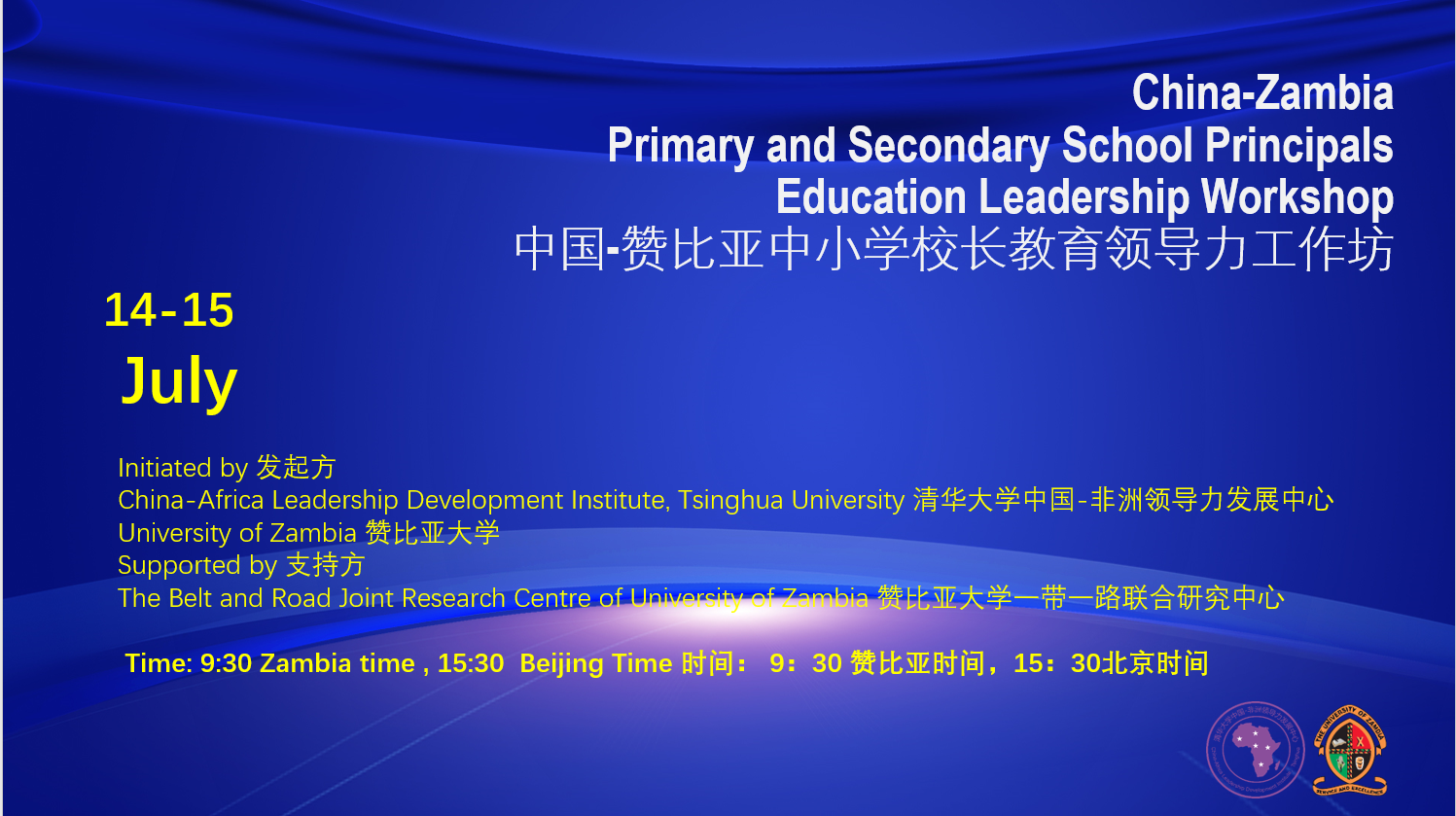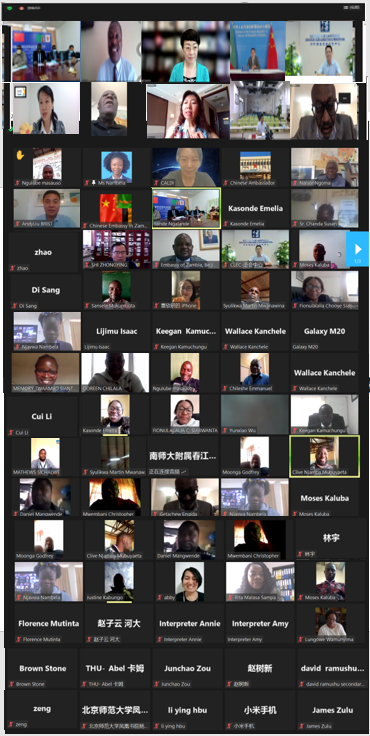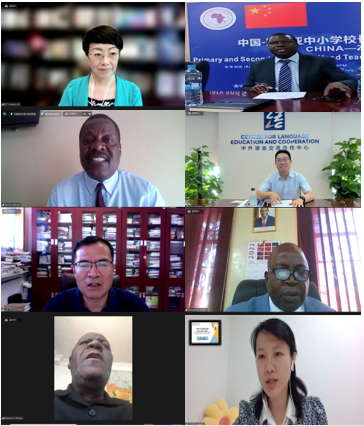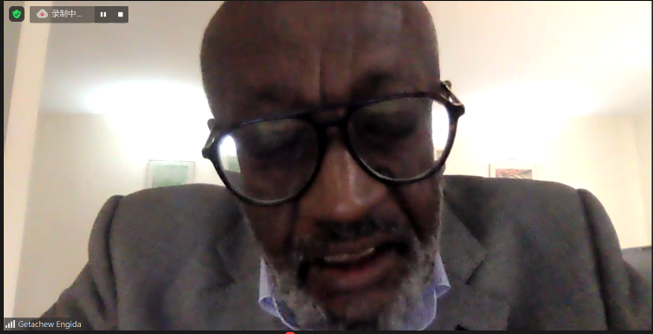In order to fulfil the consensus reached by the leaders of China and Zambia, and implement Nine Programs on China-Africa cooperation at the Eighth Ministerial Conference of the FOCAC, the "China-Zambia Primary and Secondary School Principals Educational Leadership Online Workshop" jointly initiated by the China-Africa Leadership Development Institute of Tsinghua University (CALDI) and the University of Zambia(UNZA) was successfully held from July 14 to 15. Mr. Du Xiaohui, the Chinese Ambassador to Zambia, Ms. Yvonne Mweemba Chuulu, the Director of Secondary Education from the Zambian Ministry of Education, Prof. Yang Bin, Vice President and Provost of Tsinghua University and CALDI Co-President, and Prof. Boniface Namangala, the Acting Deputy Vice Chancellor of UNZA, attended and delivered speeches. Prof. Liu Huiqin, Party Secretary of the Institute of Education (IOE) of Tsinghua University and CALDI Executive Director, and Dr. Sander, Director of the Belt and Road Joint Research Center of UNZA, moderated the meeting.

China-Zambia Primary and Secondary School Principals Educational Leadership Online Workshop
As an important part of cultural exchanges and bilateral relations, the most fundamental key of China-Zambia Educational Cooperation lies in the recognition of the people. A total of 64 Zambian Primary and Secondary School Principals signed up for the workshop. Experts, scholars and principals from education institutions in both China and Zambia made intellectual exchanges and contributed their experience in three dialogue sectors, including basic education development, teacher training and school vitality building, and online education practice. The Chinese and Zambian principal representatives had extensive communication during the school management case sharing section. The workshop had a positive effect in developing a platform for basic education community with equality and mutual trust, which laid the foundation for building a flagship project and promoting people-to-people bonding between the two countries.


Amb. Du Xiaohui and Director Yvonne delivered the opening speeches
Mr. Du Xiaohui, the Chinese Ambassador to Zambia, and Ms. Yvonne Mweemba Chuulu, the Director of Secondary Education from the Zambian Ministry of Education, expressed in their opening remarks that educational cooperation is a significant component in the Eight Major Initiatives of the FOCAC Beijing Summit in 2018 and Nine Programs announced in the 8th Ministerial Conference of FOCAC in 2021. Compared with higher education, cooperation and exchange between primary and secondary schools is less frequent. The potential in this area is vast and promising. The workshop is the first project in implementing the consensus of the heads of state on education and capacity-building, which serves the leading role of pragmatic cooperation.

Vice President and Provost Yang Bin and Deputy Vice Chancellor Boniface delivered keynote speeches
In their keynote speeches, Vice President Yang Bin and Deputy Vice Chancellor Boniface respectively pointed out the positive impact of principal education leadership training on school development, as well as the important contribution in achieving the 2030 sustainable development goals and agenda 2063 in Africa. Tsinghua University and the University of Zambia represent the higher education in both countries. The smooth launching of this workshop marks the beginning of a new chapter in educational cooperation between the two universities.

Moderator and Dialogue Guests photo (Prof.Liu Huiqin first left, Dr. Sande first right, Dr. Bentry Nthata second left, Mr. Meng Yuan second right, Prof. Shi Zhongying third left, Mr Malizani Tembo third right, Prof. Naison Ngoma Fourth left, Associate Prof. Tong Lili fourth right)
The workshop included three dialogues. In the “Basic Education Development" dialogue, Dr. Bentry Nthata, Dean of the School of Education of UNZA, and Mr. Meng Yuan, Director of the Policy Studies Division from the Center for Language Education and Cooperation of the MOE, were invited. They respectively shared ideas on the development of basic education in Zambia and Chinese teaching in Africa in their dialogue on "Teacher Training and School Vitality Building", shared by Prof. Shi Zhongying, Dean of the Institute of Education at Tsinghua University, and Mr Malizani Tembo, Principal of the Mansa College of Education. Prof. Shi Zhongying elaborated on the intention and extension of school vitality and put forward some suggestions for encouraging educational vitality in the future. Mr. Malizani focused on the college education of teacher training in Zambia. In the "Online Education Practice " dialogue, Prof. Naison Ngoma, Chairman of Saint Claire International School, and Lt. Col. ( Rtd.) Vice Chancellor Emeritus of Copperbelt University, introduced the challenges and prospects of Zambian online education. Associate Prof. Tong Lili, Deputy Director of the Educational Informatization Strategy Research Base of the MOE, and Director of the National Engineering Laboratory for Cyber Learning and Intelligent Technology(CIT) of Beijing Normal University, shared thought and practice on the digital transformation of teacher education.

Ms. Liu Yanping(left), Mr. Wang Xingang, and Mr. Isaac Lijimu(right)in Principal Management Case Sharing
In the School Management Case Sharing section, the three principal representatives from both countries exchanged views on the significance of educational leadership in school management. Liu Yanping, the Principal of the First Branch of Beijing National Day School, described the process of taking over weak schools and making them revive and thrive with a case entitled "Opening the Black Box of School Vitality". She believed that finding the soul of the school was the first priority, and the organizational structure must be adjusted to serve the development of everyone. Wang Xingang, the Principal of Zhuhai High-Tech Zone Jinfeng Primary School, made a presentation entitled " Many Little Makes Mickle - Value-oriented School Management Practice towards High-Quality Development", which illustrated the exploration and reform in the four aspects of curriculum construction, student development, teacher development and school management in serving the local community and promoting educational modernization. Isaac Lijimu, the Principal of Kabompo Secondary School in Zambia, introduced the practice and cultural characteristics of his school, especially the efforts made by the school in building quality education and providing personalized training, as well as its plan for Chinese teaching in the future.

Getachew Engida delivered the concluding speech
Prof. Getachew Engida, former Deputy Director General of UNESCO and CALDI Co-President, made the concluding speech. He introduced his ongoing capacity-building project in cooperation with the Ethiopian Minister of Education, and proposed that the reform of basic education in Africa could refer to China's development experience. CALDI could serve as the platform to deepen bilateral education cooperation.
Editors: John Olbrich, Li Han

